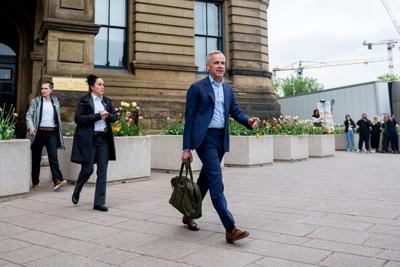Mark Carney isn’t getting much of a honeymoon as a new prime minister.
It’s been a bit of a bumpy ride since Carney swore in his new cabinet just a week ago, which featured some surprising new ministers, as well as some conspicuous absences, such as Nate Erskine-Smith, who pronounced himself disrespected.
Others kicked out of Carney’s pre-election cabinet, such as Bill Blair and Ali Ehsassi, have been less public with any disappointment they may be feeling, but there’s no question that this particular shuffle has given the prime minister’s team a morale issue to handle right off the bat.
That will become clearer next weekend, when Carney holds a caucus retreat in advance of Parliament reopening and the throne speech on Tuesday.
Some MPs are even talking about voting in favour of something called the Reform Act, which gives power to the caucus to oust fellow MPs, the caucus chair, and the leader himself.
Canadians have more trust in Prime Minister Mark Carney now than they did in former prime minister Justin Trudeau after he was first elected and during his last days in office, a new poll suggests. Bruce MacLellan, chair of Proof Strategies Inc., says Carney is off to a "great start" and that if he can maintain his integrity he'll be able to maintain people's trust for a long time. (May 20, 2025 / The Canadian Press)
My colleagues Raisa Patel and Alex Ballingall were out talking to some of these MPs on Tuesday — most of them requesting anonymity — and got the clear message that this is a caucus eager to flex a little muscle.
“It would be “refreshing,” “unexpected,” and “yet another demonstration of how different (Carney) is from Justin Trudeau,” one MP told them.
“It’s about restoring power to caucus,” another said.
“We’ve done a hard reset within the Liberal party.”
The Liberals under Trudeau never adopted the Reform Act after the three elections he won. Some have said this was because of the PMO’s tight grip over caucus, but the arguments at the time were that since a leader is elected by the party — not MPs — that’s where the power should remain.
On Tuesday, Carney convened his new ministers to take part in what was called a cabinet planning forum, billed as a discussion on how “to build a stronger economy, strengthen Canada’s trade partnerships, bring down the cost of living, and keep communities safe.”
Not on that list was the matter of message discipline, which has also been somewhat of a hot issue in the week since the new cabinet was unveiled. Three ministers have been in the spotlight for utterances that seem to be at odds with the government line.
Finance Minister François-Philippe Champagne announced there would be no budget this year, which generated days of criticism, until Carney himself told reporters travelling with him in Rome that there would in fact be a budget this year.
Then there was the puzzling statement from new Housing Minister Gregor Robertson, saying he didn’t think housing prices needed to go down. Robertson later had to clarify that he did “of course” believe in affordable housing.
Rounding out this trio of off-script remarks was Heritage Minister Steven Guilbeault, who shared with reporters his view that Canada may not need more pipelines — which of course drew immediate protest from Alberta.
All three of these cases certainly test Carney’s promises to restore “true ministerial government,” which empowers ministers to exercise authority without vetting everything through the PMO. Only a week since that bold statement was made, reporters in Ottawa may want to ask ministers when they freelance whether they’ve cleared their comments with Carney.
There’s the balance this new PM is going to have to master — how to make ministers and MPs feel more independent, without them using that independence to create problems for him.
If it’s any comfort to Carney, his is not the only party dealing with morale issues as Parliament gets set to reopen. Conservative Leader Pierre Poilievre, lacking a seat, will still be juggling dispirit in the ranks over the party’s slide from likely winner of the last election to second-place, again. The Bloc Québécois and the New Democrats are going back to the Commons with fewer MPs — in the NDP’s case, no leader and no party status either. Not only are their numbers diminished, but their leverage too.
It will all make for a more subdued tone when the House reopens. Carney has some reason to feel triumphal, presiding over the party with the most seats, but aware that he could have a restive caucus to contend with, as well as minority rule, in the weeks and months ahead.
This is a whole Parliament, in fact, built out of the humbling exercise that was the election campaign for so many of them. Given the angry, polarized state of things before the campaign, maybe it’ll be preferable to have a Commons in which parties are too busy with their own internal dynamics to focus on attacks across the aisle.
In that case, perhaps it’s fitting that King Charles will be reading the speech from the throne. Not only is he Canada’s sovereign, but he’s also an expert in family dramas.
Error! Sorry, there was an error processing your request.
There was a problem with the recaptcha. Please try again.
You may unsubscribe at any time. By signing up, you agree to our and . This site is protected by reCAPTCHA and the Google and apply.
Want more of the latest from us? Sign up for more at our newsletter page.



























To join the conversation set a first and last name in your user profile.
Sign in or register for free to join the Conversation